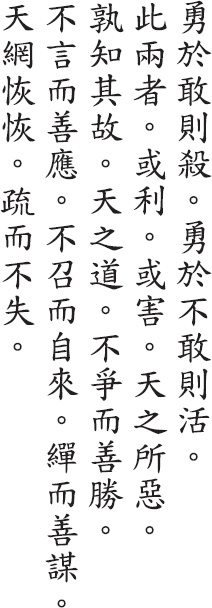73
 |
Daring to act means death daring not to act means life of these two one benefits the other harms what Heaven dislikes who knows the reason the Way of Heaven is to win without a fight to answer without a word to come without a summons and to plan without a thought the Net of Heaven is all-embracing its mesh is wide but nothing escapes |
LI HSI-CHAI says, “Everyone knows about daring to act but not about daring not to act. Those who dare to act walk on the edge of a knife. Those who dare not to act walk down the middle of a path. Of these two, walking on a knife-edge is harmful, but people ignore the harm. Walking down the middle of a path is beneficial, but people are not aware of the benefit. Thus it is said, ‘People can walk on the edge of a knife but not down the middle of a path’” (Chungyung: 9).
SU CH’E says, “Those who dare to act die. Those who dare not to act live. This is the normal pattern of things. But sometimes those who act live, and sometimes those who don’t act die. What happens in the world depends on fortune. Sometimes what should happen doesn’t. The Way of Heaven is far off. Who knows where its likes and dislikes come from?”
SUNG CH’ANG-HSING says, “The mechanism whereby some live and others die is obscure and hard to fathom. If sages find it difficult to know, what about ordinary people?”
YEN TSUN says, “Heaven does not consider life in its schemes or death in its work. It is impartial.”
LU NUNG-SHIH says, “Loosely viewed, the hard and the strong conquer the soft and the weak. Correctly viewed, the soft and the weak conquer the hard and the strong. Hence, the hard and the strong are what Heaven dislikes.”
WU CH’ENG says, “Because sages do not kill others lightly, evildoers slip through their nets, but not through the Net of Heaven. Heaven does not use its strength to fight against evildoers as Humanity does, and yet it always triumphs. It does not speak with a mouth as Humanity does, and yet it answers faster than an echo. It does not have to be summoned but arrives on its own. Evil has its evil reward. Even the clever cannot escape. Heaven is unconcerned and unmindful, but its retribution is ingenious and beyond the reach of human plans. It never lets evildoers slip through its net. Sages do not have to kill evildoers. Heaven will do it for them.”
WANG AN-SHIH says, “Yin and yang take turns. The four seasons come and go. The moon waxes and wanes. All things have their time. They don’t have to be summoned to come.”
LI HUNG-FU says, “It wins because it doesn’t fight. It answers because it doesn’t speak. It comes because it isn’t summoned. If it had to fight to win, something would escape, even if its mesh were fine.”
After line seven, the Fuyi, Suotan, and Wangpi editions have: “Thus, even sages find it hard.” However, this line does not appear in the Mawangtui, Chinglung, or Suichou editions, Tunhuang copies P.2347, P.2517, S.6543, or the Yentsun text. Ma Hsu-lun considers it an interpolation from verse 63, where it also appears, and I tend to agree. The last two lines have become a proverb in China. This verse is not present in the Kuotien texts.